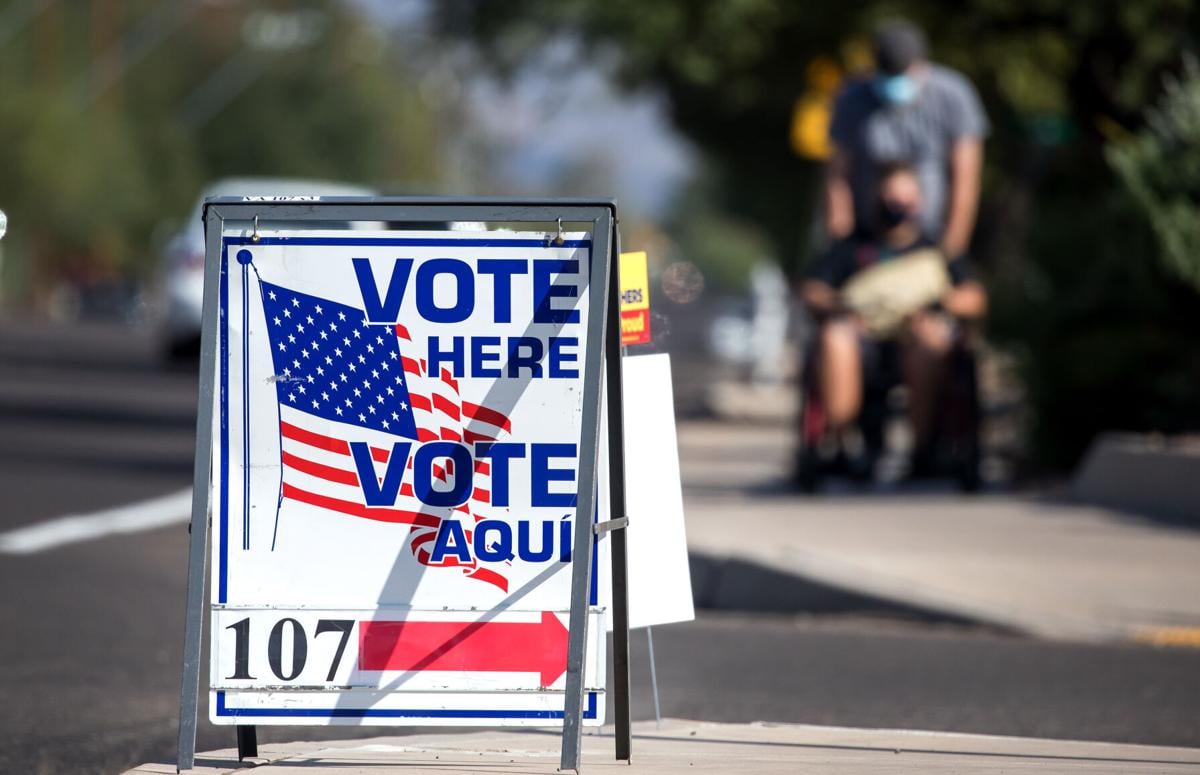You know Arizona's Legislative majority is worried about an idea when they try to stamp it out before it's even fully formed.
That's what's going on with the far-right Arizona Freedom Caucus and ranked-choice voting.
This system of voting exists in two other states and a growing number of cities. But right-wingers are worried that if Arizona adopts some version of the system, it will keep their own from being elected.
Republican National Committeeman Tyler Bowyer put it this way in one of his many Twitter posts about ranked-choice voting last year.
"You will never get actual conservatives in states with jungle primaries and ranked-choice voting," he wrote. "Why? In conservative areas where two Republicans make the top of ballot, Democrats will always support the RINO/Moderate."
Bowyer got the RNC to pass a resolution opposing ranked-choice voting, and now legislative Republicans are trying to ban it by law and in a vote of the people. But Arizona voters may well get a chance to consider the idea anyway, as an initiative on the 2024 ballot.
Tucson attorney Ted Hinderaker has been encouraging me to check it out for months. He is part of a group, called Save Democracy Arizona, that is formulating the plan to put ranked-choice voting on the state ballot in 2024.
The group's supporters include many business-oriented centrists from both parties. When I spoke with Hinderaker Tuesday morning, he was about to drive up to Phoenix for a board meeting with Tucsonans Sarah Smallhouse, president of the Thomas R. Brown Foundation; Nicole Barraza of the Southern Arizona Leadership Council; and Si Schorr, the longtime Tucson attorney and local political player.
Others involved include Chuck Coughlin, the Republican political consultant at Highground Inc.; Fred DuVal, the Arizona Board of Regents chair-elect and former Democratic candidate for governor; Scott Smith, the Republican former mayor of Mesa; Ron Barber, the Democratic former congressman from Tucson; Rex Scott, the Democratic Pima County Supervisor; and Edmund Marquez, the Tucson Republican and member of the Rio Nuevo board.
It's a who's who of Arizona's business-oriented centrists. As a body, it's a group I view with just a little less skepticism than the Arizona Freedom Caucus.
In 2022, Alaska used a ranked-choice voting system similar to what a group is considering proposing for Arizona. Among the statewide offices, the system produced a Democratic member of the U.S. House, a moderate Republican U.S. senator, and a conservative Republican governor.
But the idea they're focusing on, to me, is intriguing. They have not yet settled on a detailed plan to start circulating on petitions, but one they are considering would look like this:
• All parties' candidates for state offices, including Legislature, would run together in one primary.
• The top five candidates in that primary would be on the ballot for the general election.
• Voters would rank the candidates from 1 to 5 in order of preference.
• If a candidate wins the majority of the first-place rankings, that candidate is elected.
If not, the process is a little hard to grasp at first. If no candidate wins a majority of the first-place rankings, then the fifth-place candidate's votes would no longer be counted. People who ranked the fifth-place candidate first on their ballot would instead have their second choice counted.
If that produces a majority winner, then the election is over. But if not, the same process is repeated for the fourth-place finisher. Those who ranked the fourth-place finisher first would instead have their second-ranked candidate counted.
This process goes on until one candidate has a majority.
It sounds complicated, but Maine and Alaska use a similar system, as do cities such as San Francisco and Oakland, California; Minneapolis and St. Paul, Minnesota; New York City; and Las Cruces and Santa Fe, N.M.
In Alaska in 2022, the system produced a surprise winner for its one U.S. House seat: Democrat Mary Peltola, who defeated, among others, Sarah Palin. But the system also re-elected moderate Republican U.S. Sen. Lisa Murkowski and conservative Republican Gov. Mike Dunleavy.
"We’re not trying to favor any political party or group," Hinderaker told me. "We’re trying to free the candidates who are elected to do their job. The result will likely be there are more moderates and pragmatists."
The key to this is that highly partisan primary voters would no longer have as much power to defeat incumbents who don't hew to the party line. When everybody runs in the same primary, a party can't punish somebody who, for example, goes rogue on hot-button issues like gun-law reforms.
At a March 14 news conference, Sen. Justine Wadsack, of Legislative District 17 in Tucson, joined Sen. Anthony Kern (an attendee at the Jan. 6 2021 at the U.S. capitol) and Rep. Austin Smith, among others, to denounce ranked choice voting.
Wadsack said, "It makes no sense that we'd be moving toward such a complicated voting system at a time when voter confidence in our system is already understandably at a low, and it's already incomprehensibly and routinely taking some states, including Arizona, weeks to count votes and determine our winners."
I think this may be the best argument against ranked-choice voting: It's complicated.
But one of the best arguments for it is that people like Wadsack, Kern, Smith and Bowyer desperately want to keep Arizonans from considering it. I think it's pretty clear what they're afraid of.




